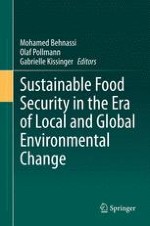2013 | OriginalPaper | Buchkapitel
11. The Role of Bahrain Local Food Production System in Ensuring Sustainable Food Security
verfasst von : Salma Saeed Ahmed Bani, Phd Scholar
Erschienen in: Sustainable Food Security in the Era of Local and Global Environmental Change
Verlag: Springer Netherlands
Aktivieren Sie unsere intelligente Suche, um passende Fachinhalte oder Patente zu finden.
Wählen Sie Textabschnitte aus um mit Künstlicher Intelligenz passenden Patente zu finden. powered by
Markieren Sie Textabschnitte, um KI-gestützt weitere passende Inhalte zu finden. powered by
